Food inspection is integral to food safety, as it ensures that your product meets government standards. This audit is typically performed by a third-party auditor who verifies that your business follows proper food handling procedures and laws.
This process ensures that your company’s top priority is to minimize the possibility of poisoning customers due to contamination. However, inspecting food in your company is challenging because untrained individuals might get injured or sick during the process.
Thus, the inspector should have experience in reading labels and understanding food and drug administration (FDA) regulations. Aside from that, they also must be able to identify potential hazards in the kitchen to prevent injuries and food contamination.
That said, you must invest in food inspection systems so you can reap the following five benefits:
Table of Contents
Boosting Customer Satisfaction
When it comes to food industries, customer satisfaction is a must. Your companies satisfy customers’ needs and make them happy with your food products. If you can meet your buyers continuously, they will return more often and recommend your offers to their peers.
With the right food inspection system, you can keep track of all aspects of your business to ensure that your customers always get what they pay for.
This technology eliminates any unwanted reactions from your buyers who may have allergies or dietary restrictions like gluten sensitivities or lactose intolerance.
To ensure that you’re working with credible service providers, you must visit TDI Packsys website for more information.
Minimizing Food Waste
If you’re not regularly inspecting your food supply, you may run out of some products before they expire. When this happens, you’ll have to throw away more inventory than necessary because they weren’t properly inspected or stored.
Aside from that, it’s hard to determine when products in your stores need replacement if you don’t review them regularly.
Food inspection systems help to reduce food waste by ensuring that your store or restaurant only sells fresh products. This technology includes advanced systems like temperature monitoring to help you identify potential contamination issues before they get out of hand.
In addition, this system will send you real-time alerts when temperatures are too high or too low so that you can take immediate action.
Flow monitoring is another feature of a food inspection system that tracks the flow of products through your facility. This capability enables you to quickly identify areas where there might be delays in processing to ensure that only fresh products are being served to customers or sold at retail locations.
Additionally, this technology ensures that inventory levels are accurate at all times so that no items go unsold due to a lack of supply from the supplier.

Improving Food Quality
A business’s ability to deliver quality foods determines whether it will thrive or fail in the market. If you consistently provide high-quality items to your buyers, you can increase their perception of your brand, encouraging loyalty.
On the other hand, poor-quality items may harm your organization’s reputation and even cause you to lose prospective clients who may never come back to your store again.
When using a food inspection system, you can determine whether your product meets the required standards or not. If there is any deviation from your criteria, you can take the necessary steps to rectify it before sending it out for sale or consumption by customers.
In turn, you can ensure that only good quality food products are sold at your store, improving customer satisfaction.
Increasing Profits
Buyers are less likely to purchase from a company implicated in food contamination. Even if the company were not responsible for the contamination, some customers would avoid buying from them because they don’t want to take any chances.
This loss of sales may be permanent or temporary, depending on how widespread the news coverage is about their products.
Educating your bottom line is one of the best ways to increase your company’s profits. For instance, you may ensure that your kitchen staff follows proper sanitation procedures, especially while handling and preparing food.
Then, you can use a food inspection system to ensure that this happens by tracking how often employees wash their hands or if they use gloves when handling certain foods.
Enhancing Brand Image
When expanding your food business, you must generate investors’ funds. If there are negative reviews about food contamination on the Internet, you may be unable to persuade potential partners to support your company financially.
However, if you have a strong brand image, investors will see the potential in your company.
By using food inspection systems, you can enhance your company’s branding. These systems allow you to store all products’ records and ensure that they meet legal or regulatory standards.
This protects your food business against any damage caused by poor-quality products and negative online reviews.
Key Takeaway
As a food business owner, you should protect your company’s reputation. Such measures might include investing in food inspection systems. In doing so, you stand to gain these five benefits and ensure your company’s success.

